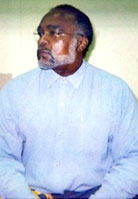Tookie: From chaos to consciousness
Published Dec 8, 2005 10:40 PM
The name Stanley Tookie Williams is both
famous and infamous.
Infamous because of his multiple murder convictions
in California, which led him to death row; famous because of his works while
there and the growing movement to spare his life and perhaps achieve his freedom
from California’s notorious San Quentin prison.
Those works include
the writing of several award-
winning, anti-gang and anti-violence books,
many of them written especially for young folks, which have turned many away
from the perils and pitfalls of gang life.
They respond to Tookie,
because they know that he knows what he’s talking about. Tookie is one of
the founders of the Crips gang, which has spread all across the nation. As one
of the founders of Cripdom, his words have a resonance that others, either in
government or the church, simply can’t match.
Tookie’s life
example is also known to us through the acting of the Oscar-winning Jamie Foxx,
who portrayed the muscular former gangbanger in a teledrama called
“Redemption.” Foxx, the man and celebrity, has joined the call to
California’s governor, fellow actor Arnold Schwarzenegger, to commute his
death sentences to life. Just recently, Foxx was joined by his fellow actor,
Will Smith, and rapper Snoop Dogg, who has echoed Foxx’s call.
Several months ago, the anti-death penalty publication The New
Abolitionist (published by the Chicago-based Campaign to End the Death Penalty)
published a brief letter from Tookie in which he addressed the issues of both
his innocence and his sincerity. He wrote:
“My detractors in the
media and elsewhere have questioned my redemption. Their doubt is driven largely
by my open apology (at www.tookie.com) to Black folks and others who might have
been offended by the fact that I helped create the Crips youth gang in Los
Angeles 34 years ago. My detractors argue that I could not be redeemed because I
have not apologized to the family members of the victims that I was convicted of
killing.
“But please allow me to clarify. I will never apologize
for capital crimes that I did not commit—not even to save my life. And I
did not commit the crimes for which I was sentenced to be executed by the State
of California.
“Being a condemned prisoner, I am viewed among the
least able to qualify as a promoter of redemption and of peace. But the most
wretched among society can be redeemed, find peace and reach out to others to
lift them up. Redemption cannot be faked or intellectualized. It must be
subjective, experienced and shared. In the past, redemption was an alien concept
to me. But from 1988 to 1994, while I lived in solitary confinement, I embarked
on a transitional path toward redemption. I underwent years of education,
soul-searching, edification, spiritual cultivation, and fighting to transcend my
inner demons.
“Subsequently, the redeeming process for me
symbolized the end of a bad beginning—and a new start.” (From The
New Abolitionist, Aug. 2005, p. 2.)
Stanley Tookie Williams has been
nominated several times for the prestigious Nobel Peace Prize for his work in
support of street peace and in anti-gang efforts. He has written nine anti-gang
and anti-violence books and created the Internet Project for Street Peace, which
connects youth globally in support of that end.
That said, Tookie has a
date with death:
Dec. 13, 2005!
What makes Tookie’s case doubly
disturbing is that the state played fast and loose with jury selection by
kicking off three potential Black jurors, resulting in a virtually all-white
jury to decide both his guilt and whether he should live or die. (There were 10
Caucasians; one Filipino and one Latino.)
Is racial jury-rigging a
“minor” thing?
Just recently, in Philadelphia, a man who had
been on death row for over a decade for multiple murders had his retrial. His
original conviction was tossed because of a violation of the Batson rule (which
forbids the removal of Black jurors). A racially mixed jury acquitted him of all
charges.
It can be said that Tookie didn’t receive a fair trial, by
any standard. How can he then face death?
The death penalty has been
losing steam for years, largely because of cases which were “won” by
unfairness.
With the support of the people, that may be ending, as the
fight for the life of Tookie begins!
Articles copyright 1995-2012 Workers World.
Verbatim copying and distribution of this entire article is permitted in any medium without royalty provided this notice is preserved.
Workers World, 55 W. 17 St., NY, NY 10011
Email:
[email protected]
Subscribe
[email protected]
Support independent news
DONATE


